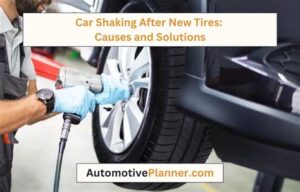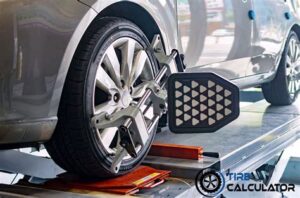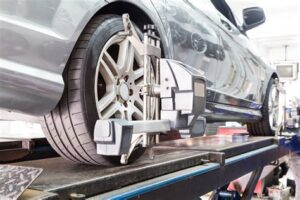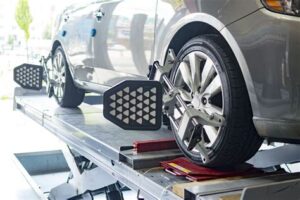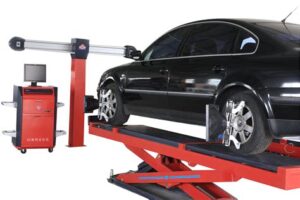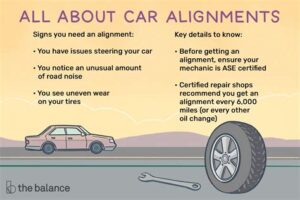Discover the causes of car shaking, impacts of new tires, wheel alignment effects, tire balance issues, and essential inspection and maintenance tips.When you invest in new tires and a fresh wheel alignment for your vehicle, you expect a smoother ride, not an unexpected shake. If you’ve recently experienced vibrations or shaking after this maintenance, it can be frustrating and alarming. Understanding the underlying causes of this issue is essential for ensuring your vehicle’s performance and safety. Various factors, from improper installation to tire balance problems, can contribute to a bumpy driving experience. In this blog post, we’ll explore the common causes of car shaking after new tires and alignment, the impacts these changes can have, and offer valuable inspection and maintenance recommendations to help you restore a smooth and stable ride. Whether you’re a seasoned car enthusiast or a casual driver, our insights will guide you in diagnosing and resolving these unsettling vibrations.
Causes of Car Shaking
Experiencing car shaking can be unsettling, especially after making significant changes like installing new tires or having your vehicle aligned. There are several potential causes of this issue, which can range from simple to complex.
One common reason for car shaking is improperly installed tires. If the new tires are not mounted correctly, they can lead to an imbalance that creates vibrations. Tire balance is crucial for a smooth ride, and any discrepancies can result in shaking, particularly at higher speeds.
Another potential factor is wheel alignment. If the alignment is off, it can cause uneven tire wear, creating a situation where some tires grip the road differently than others. This discrepancy can trigger vibrations during driving, indicating that the alignment requires readjustment.
Lastly, it’s important to consider other components that can contribute to car shaking. These might include worn suspension parts, brake issues, or even problems with the drive shaft. It’s essential to conduct a thorough inspection if the shaking persists.
Impact of New Tires
When you invest in new tires for your vehicle, you expect enhanced performance, safety, and comfort. However, it’s crucial to recognize that improperly fitted or incompatible tires can lead to significant issues, including a car that shakes after new tires have been installed. Understanding the impact of new tires can help you better appreciate the importance of selecting the right type and ensuring proper installation.
New tires can greatly affect vehicle dynamics and overall driving experience. They are designed to improve grip and handling, which can enhance your car’s stability and braking efficiency. Nevertheless, if the tires are not the right size, type, or if they are installed poorly, you might notice unsettling vibrations while driving. This is often a result of misalignment that can occur as new tires interact with other components of the vehicle.
Additionally, the brand and model of tires play a significant role in your car’s performance. For instance, some tires are engineered for specific weather conditions, such as wet or snowy surfaces. Using inappropriate tires for your driving conditions can lead to a lack of control and increased shaking at higher speeds. Therefore, always consult a professional to ensure that your new tires are suitable for your vehicle and properly aligned to prevent shaking and other issues.
Effect of Wheel Alignment
When you invest in new tires for your vehicle, proper wheel alignment is crucial to ensure optimal performance. Wheel alignment refers to the adjustment of the angles of the wheels so that they are parallel to each other and perpendicular to the ground. When these angles are incorrect, it can lead to several issues, including car shaking after new tires have been installed.
Misalignment can cause your vehicle to behave unpredictably on the road. For instance, you may notice that your car pulls to one side or that the steering wheel is off-center. These symptoms often lead to a bumpy ride, contributing to that unsettling feeling of shaking. Furthermore, foundation problems and uneven tire wear can exacerbate the shaking sensation.
To combat these issues, it’s recommended to have a professional wheel alignment performed as soon as you notice any signs of unevenness or shaking. A proper alignment not only improves handling and safety but also helps to extend the life of your new tires by promoting even wear.
Potential Tire Balance Issue
One of the primary reasons for a car to shake after getting new tires and alignment is a potential tire balance issue. When tires are installed, it is crucial that they are balanced properly. An imbalance can occur due to uneven weight distribution across the tire and wheel assembly, which may lead to vibrations at certain speeds.
To understand how this happens, it’s important to recognize that wheels need to be balanced to ensure a smooth ride. Technicians often use a balancing machine to spin the wheels and identify any heavy spots that need adjustment. If this step is skipped or done improperly, you may experience unwanted vibrations as you drive, especially at higher speeds.
Neglecting to address tire balance issues can lead to more than just discomfort while driving. It can also cause premature wear on your suspension components, tires, and other vehicle parts. Therefore, if you notice shaking post-installation, it is advisable to return to the shop and have your tires professionally balanced.
Inspection and Maintenance Recommendations
To ensure your vehicle runs smoothly and to prevent issues like car shaking after new tires and alignment, periodic inspection and maintenance are crucial. Regular checks can help identify problems early, saving you time and money in the long run. Below are some essential recommendations for maintaining your vehicle:
- Tire Pressure Checks: Regularly check your tire pressure, as both over-inflation and under-inflation can cause shaking. Use a reliable tire gauge and ensure your tires are inflated to the manufacturer’s specifications.
- Visual Inspections: Frequently inspect your tires for signs of wear, such as uneven tread, cuts, or bubbles. An uneven tread pattern can lead to vibrations while driving.
- Regular Wheel Alignment: Schedule wheel alignment checks at least once a year. Proper alignment ensures that all four wheels are parallel, reducing the chances of car shakes and increasing the lifespan of your tires.
- Tire Rotation: Rotate your tires every 5,000 to 7,500 miles to promote even wear. This is particularly important after installing new tires.
- Balancing Tires: Ensure your tires are balanced properly when installed. An unbalanced tire can cause vibrations, especially at higher speeds. Consider rebalancing after significant tire adjustments.
In addition to the recommendations listed above, make it a habit to keep up with your vehicle’s maintenance schedule as suggested in the owner’s manual. This includes regular oil changes, brake checks, and inspection of essential components.
Lastly, if you notice any persistent issues, such as car shaking or abnormal vibrations even after following these recommendations, consult a professional mechanic promptly. Early intervention can prevent further damage and ensure your safety on the road.
Frequently Asked Questions
Why do my car shakes after getting new tires?
New tires may cause vibrations if they are not properly balanced or if they are defective. It’s essential to ensure that they are correctly mounted and balanced.
Could alignment cause my car to shake?
Yes, poor alignment can lead to uneven tire wear and vibrations. If the wheels are not aligned correctly, they can pull in one direction or cause shaking at certain speeds.
What should I do if my car shakes after an alignment?
If your car shakes after an alignment, you should return to the shop where you had the service performed to have them reassess the alignment and check other related components.
Is it common for a car to shake after new tires are installed?
While some vibration can occur, a significant shake is not typical and usually indicates an issue with installation, balancing, or other components.
What are some signs that my new tires are causing a problem?
Signs include persistent shaking, uneven tire wear, or pulling to one side. If these occur, it’s important to have your tires inspected.
How can I prevent shaking after new tires and alignment?
Regularly check tire pressure, ensure proper balance and alignment during installation, and monitor tire wear to prevent future shaking.
Can I drive my car if it shakes after new tires?
Driving a car that shakes can be unsafe, as it may indicate a serious issue. It’s best to have it inspected before driving long distances.
